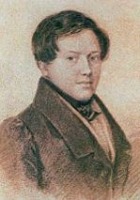Yevgeny Baratynsky
Yevgeny Baratynsky Poems
A bard's sweet song mends ailing constitution.
The harmony's ever-mysterious reign
Will compensate the cumbersome illusion
And curb the sense that's passionate and strained.
...
Poison, we drink in love - the sweetest one,
But that's the poison, what we drink,
And always pay for joy, that's briefest one,
With sadness of the long days' link.
...
Don't imitate: the gift is special here,
And with its own greatness it is great;
Either Doratov or the new Shakespeare -
You are not liked: they hate returning, yet.
...
But your invasion, so fine,
That tremor of the spirit thrilling,
Is a herald of the future pines.
...
I did not blinded with the Muse, my dear:
She'll not be called the beauty, charming heart,
And throngs of youths, when sought her passing here,
As crazy lovers, will not run behind.
...
When fixed his gaze upon the stone,
The artist saw a nymph inside,
And fire ran through vein his own -
He flew to her in all his heart.
...
When, by sorrow inspired,
The poet sings his own pine,
Whose soul will be cold and tired
To give not him the answer, fine?
...
Wise Providence gave our perception
The choice between two different fates:
Either blind hope and agitation,
Or hopelessness and deadly rest.
...
You're useless, days! The earthly world will never
Change its used games!
We know them all, and our future, clever,
Predicts the same.
...
We diligently watch the world,
We diligently watch the people -
Wait for the wonder in their middle.
And what are fruits of the long years' plots?
...
Yevgeny Baratynsky Biography
Yevgeny Abramovich Baratynsky (2 March 1800 – July 11, 1844) was lauded by Alexander Pushkin as the finest Russian elegiac poet. After a long period when his reputation was on the wane, Baratynsky was rediscovered by Anna Akhmatova and Joseph Brodsky as a supreme poet of thought. Of noble ancestry, Baratynsky was educated at the Page Corps at St. Petersburg, from which he was expelled at the age of 15 after stealing a snuffbox and five hundred roubles from the bureau of his accessory's uncle. After three years in the countryside and deep emotional turmoil, he entered the army as a private. In 1820 the young poet made his acquaintance with Anton Delvig, who rallied his falling spirits and introduced him to the literary press. Soon Baratynsky was transferred to Finland, where he remained six years. His first long poem, Eda, written during this period, established his reputation. In January 1826, he married the daughter of the Major-General Gregory G. Engelhardt. Through the interest of friends he obtained leave from the tsar to retire from the army, and settled in 1827 in Muranovo near Moscow (now a literary museum). There he completed his longest work, The Gipsy, a poem written in the style of Pushkin. Baratynsky's family life seemed to be happy, but a profound melancholy remained the background of his mind and of his poetry. He published several books of verse that were highly valued by Pushkin and other perceptive critics, but met with the comparatively cool reception of the public, and violent ridicule on the part of the young journalists of the "plebeian party". As the time went by, Baratynsky's mood progressed from pessimism to hopelessness, and elegy became his preferred form of expression. He died in 1844 at Naples, where he had gone in pursuit of a milder climate.)
The Best Poem Of Yevgeny Baratynsky
A Bard's Sweet Song...
A bard's sweet song mends ailing constitution.
The harmony's ever-mysterious reign
Will compensate the cumbersome illusion
And curb the sense that's passionate and strained.
The poet's soul, in a verse poured out,
Will be released from all her heavy pines;
And holy poetry will give the world around
And all its purity - to its girlfriend, at once.
